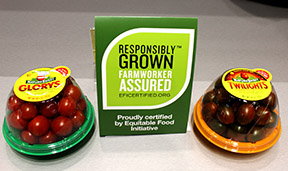Every generation is shaped by its own habits and morals. Today’s generational sweethearts are the oft talked about millennials, who are sometimes labeled as “entitled” but are also seen as game changers with a deep desire to make a difference through social participation.
 Numbering nearly 80 million—the largest generation since the baby boomers—millennials are now poised to spend more than boomers. It’s this buying power combined with their preferences that’s changing the food industry, especially how brands view and market themselves.
Numbering nearly 80 million—the largest generation since the baby boomers—millennials are now poised to spend more than boomers. It’s this buying power combined with their preferences that’s changing the food industry, especially how brands view and market themselves.
When it comes to food choices, millennials are more likely to avoid processed food and are hesitant to trust larger brands. According to a study from Mintel, more than two in five millennials (43 percent) do not trust large food manufacturers, compared to 18 percent of non-millennials. Mintel notes that as millennials pursue food from retailers and brands they perceive as trustworthy, they are blending the idea of “authentic” with “ethical.”
Simply put, this younger generation values brands that make social responsibility a priority. Millennials define social responsibility as being ethical, protecting the environment with sustainability practices and seeking to do good in the community. And it’s not enough for millennials to observe what companies or brands are doing; they want to actively engage in the conversation. In fact, 72 percent say they would voice their opinions to companies about corporate social responsibility efforts (Cone Communications study). As digital natives, these consumers are more likely to amplify such messages among their own social networks.
 EFI-certified supplier NatureSweet Tomatoes is an example of a produce company that’s engaging with consumers by promoting its corporate social responsibility efforts with the Tomatoes Raised Right marketing campaign. “Now more than ever, consumers want to know where their food comes from, and it’s our responsibility as a company to give consumers an authentic look into the story of how we raise our tomatoes, from seed to shelf,” said Kathryn Ault, Vice President of Customer Solutions, NatureSweet Tomatoes.
EFI-certified supplier NatureSweet Tomatoes is an example of a produce company that’s engaging with consumers by promoting its corporate social responsibility efforts with the Tomatoes Raised Right marketing campaign. “Now more than ever, consumers want to know where their food comes from, and it’s our responsibility as a company to give consumers an authentic look into the story of how we raise our tomatoes, from seed to shelf,” said Kathryn Ault, Vice President of Customer Solutions, NatureSweet Tomatoes.
Eve Turow Paul, millennial food culture expert and author, states it best: “Those who grow our food are the true change-agents. Farmers make innumerable choices every day that can have beneficial or grave effects on the health of soil, water, air and physical well-being. As such, consumers are increasingly putting their money where their values are—toward brands and products they trust, and in support of farmers who use methods that comfort the shopper.”
Whole Foods Market continues to be a model retailer that is setting a good example of delivering on millennials’ desire for corporate social responsibility. Environmentally sustainable packaging, fair wage standards and its “Responsibly Grown” program address specific social responsibility issues. In fact, Equitable Food Initiative (EFI) works closely with Whole Foods Market to benchmark EFI Standards for labor practices, food safety and pest management, allowing third-party certified fruits and vegetables to bear EFI’s Responsibly Grown, Farmworker Assured™ label.
EFI certification, which assures conformance with more than 300 rigorous standards, is a tool that helps growers adopt a greater culture of social responsibility while offering a level of trust and transparency to consumers.
 “Back in 2009, NatureSweet made a commitment to social responsibility, and we have aligned with EFI for the common goal of transforming the lives of our agricultural workers,” said Ault. “Making a difference in people’s lives is rewarding — it’s good for the industry and also for the quality of products we produce. People ask us if it’s too expensive to have a socially responsible company, but I view it as it’s too expensive not to.”
“Back in 2009, NatureSweet made a commitment to social responsibility, and we have aligned with EFI for the common goal of transforming the lives of our agricultural workers,” said Ault. “Making a difference in people’s lives is rewarding — it’s good for the industry and also for the quality of products we produce. People ask us if it’s too expensive to have a socially responsible company, but I view it as it’s too expensive not to.”
Like so many change-driven programs, EFI brings cultural shifts to farms, leading to a collaborative and respectful work environment, an engaged workforce and strong relationships based on trust. “If a person feels valued in the job, they will do a better job, and they are more conscious —that’s what counts. You want to do the right thing for everyone involved. We’re proud of the work we’re doing with EFI,” said Dan Borer, General and Sales Manager for Keystone Fruit Marketing.
It’s true that money talks. With $200 billion in annual buying power, millennials are hard to ignore. Companies on the leading edge of social responsibility do the right thing long before anyone asks, others make changes when they see a trend coming, yet others wait until it’s mandated. Either way, in the case of social responsibility all change is good change, regardless of who asks for it or why it’s happening.
Millennials might get blamed for things like the slow death of golf, bar soap, napkins, diamonds, home ownership, wine corks and department stores, but it’s hard to place blame on anyone for wanting better food produced in a way that lifts up the people who produce it and cares for the environment. Here’s a moment when we should all say “thank you” to millennials because when brands make corporate social responsibility a priority they are not only doing the right thing but also providing a level of reassurance and trust to all of us.
The EFI label alerts consumers that the fruits and vegetables they are buying are Responsibly Grown, Farmworker Assured™ and that the certified farms met more than 300 rigorous standards for labor practices, food safety and pesticide management.

